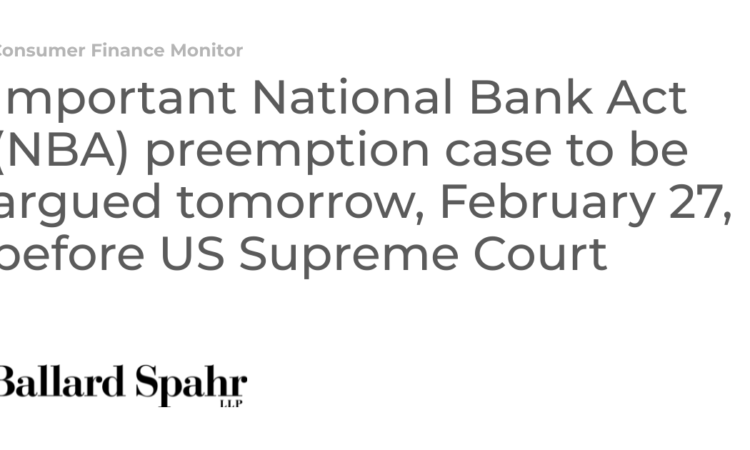Important National Bank Act (NBA) preemption case to be argued tomorrow, February 27, before US Supreme Court

The oral argument in Cantero v. Bank of America, N.A. will be heard on Tuesday, February 27 before the US Supreme Court. The Court recently granted the unopposed motion of the Solicitor General to participate in the oral argument. The Solicitor General will be taking 10 minutes of the oral argument time allocated to the Petitioners. The Office of the Comptroller of the Currency did not submit an amicus brief and will not be participating in the oral argument. However, eight former Comptrollers of the Currency submitted an amicus brief supporting Bank of America and disagreeing with the brief filed by the Solicitor General.
As discussed in our earlier blogs here and here, the question before the Court is whether the NBA preempts a New York statute requiring banks to pay interest on mortgage escrow accounts. Reversing the district court, the Second Circuit ruled that the application of the New York statute to national banks is preempted by the NBA.
The Petitioners submitted their reply brief on February 16. In their brief, petitioners made the following points in response to Bank of America’s merits brief:
- The Second Circuit’s “control test” supported by Bank of America, under which state laws that control or otherwise hinder national banks’ exercise of their federally conferred powers are preempted, cannot be harmonized with Dodd-Frank Section 1044 (12 U.S.C. Sec. 25b). Under subsection 25(b)(1)(B), a state law is preempted “only if” it “prevents or significantly interferes with” the exercise of a national bank’s powers, in … Barnett Bank.
- The “control test” also clashes with the provisions in Section 25b governing OCC preemption determinations, which require a “fact-finding” as to the practical impact when making preemption determinations. While these and other provisions apply directly to the OCC and not the courts, they shed light on what standard should be applied by the courts.
- Adopting Bank of America’s “control test” would require reading Section 25b to have no real effect. Section 25b(b)(1) states that “State consumer financial laws” are preempted “only if” one of three conditions is met: (1) the state law discriminates against a national bank in favor of a state bank; (2) the state law “prevents or significantly interferes with” the exercise of a national bank’s powers under the holding in the Barnett Bank case; or (3) the state law is preempted by a federal statute other than the NBA. None of these conditions is satisfied here.
- The broad categorical field preemption regulations the OCC promulgated in 2004, which were reiterated in 2011, are contrary to the holding of Barnett Bank. Bank of America has not shown that the New York statute requiring it to pay 2% interest on mortgage escrow accounts prevents or significantly interferes with a national bank’s power to provide escrow services.
- Bank of America’s policy concerns are way overblown and, in any event, provide no basis for nullifying the statutory text of the NBA.
As pointed out in our earlier blog, the Court’s ruling in Cantero has the potential to significantly disrupt national banks’ ability to rely on federal preemption of state laws, including many state consumer protection laws, and could embolden state AGs and private plaintiffs to pursue actions against national banks claiming violations of state consumer laws.
Ballard Spahr will host a webinar roundtable on April 3, 2024 entitled “The U.S. Supreme Court’s Decision in Cantero v. Bank of America, N.A.: Who Will Win and What Does it Mean?” featuring a panel of lawyers who submitted amicus briefs in the case supporting both sides. One of our participants submitted an amicus brief supporting Bank of America on behalf of eight former Comptrollers of the Currency and several other former senior officials at the OCC. During our webinar roundtable, we will share insights, based on the oral argument and the briefing, about the likely outcome in this matter, the viability of the OCC’s regulations, and the expected impact on national banks if the Court reverses the Second Circuit. Register here.





